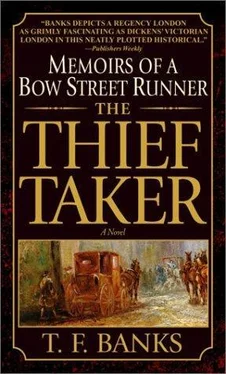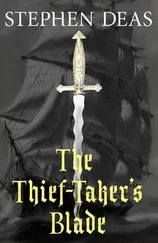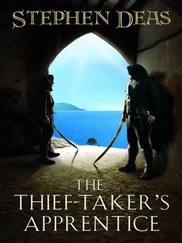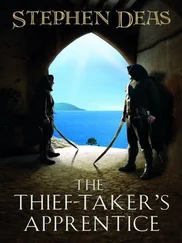T.F. Banks - The Thief-Taker
Здесь есть возможность читать онлайн «T.F. Banks - The Thief-Taker» весь текст электронной книги совершенно бесплатно (целиком полную версию без сокращений). В некоторых случаях можно слушать аудио, скачать через торрент в формате fb2 и присутствует краткое содержание. Жанр: Исторический детектив, на английском языке. Описание произведения, (предисловие) а так же отзывы посетителей доступны на портале библиотеки ЛибКат.
- Название:The Thief-Taker
- Автор:
- Жанр:
- Год:неизвестен
- ISBN:нет данных
- Рейтинг книги:5 / 5. Голосов: 1
-
Избранное:Добавить в избранное
- Отзывы:
-
Ваша оценка:
- 100
- 1
- 2
- 3
- 4
- 5
The Thief-Taker: краткое содержание, описание и аннотация
Предлагаем к чтению аннотацию, описание, краткое содержание или предисловие (зависит от того, что написал сам автор книги «The Thief-Taker»). Если вы не нашли необходимую информацию о книге — напишите в комментариях, мы постараемся отыскать её.
The Thief-Taker — читать онлайн бесплатно полную книгу (весь текст) целиком
Ниже представлен текст книги, разбитый по страницам. Система сохранения места последней прочитанной страницы, позволяет с удобством читать онлайн бесплатно книгу «The Thief-Taker», без необходимости каждый раз заново искать на чём Вы остановились. Поставьте закладку, и сможете в любой момент перейти на страницу, на которой закончили чтение.
Интервал:
Закладка:
The coach bounced through a pothole and the driver cursed. Morton gazed thoughtfully out the window.
Arabella sighed, signaling that he was not paying attention to her as he should. Morton turned back to her.
“Is it not the saddest thing?” she asked. “If you had heard poor Miss Hamilton cry out, Henry, you would have done anything to ease her pain. I tell you, it was wrenching. I could never duplicate it.” She pitched her voice low and tried anyway. “ ‘Oh, Richard. Richard …’”
“Very touching, I'm sure,” Morton said. “There is only one problem….”
Arabella raised one perfect eyebrow.
“His name was not Richard.”
Chapter 2
You don't believe me, do you?” Arabella demanded as soon as she had shed her wrap. They had come to her lodgings in Theobald's Road.
“Don't believe what, pray?” Morton did not care much for her mood, which was combative and testy.
“About the jarvey.”
“You said he was frightened near to death and fled without demanding his fare, which I admit is suspicious.”
“Do not mock me, Henry Morton,” she said coldly.
Morton regarded her seriously. She really was the most beautiful woman. “You should not knit up your perfect brow so.”
“I shall crochet it if it pleases me.”
Morton wanted to take her in his arms-somehow wanted it even more because he knew the timing was not right at all. Instead, he dropped into one of her comfortable chairs, and caught sight of himself in a looking-glass: a big man, large-boned, and lean from years of Gentleman John's brutal “toughening.” His brow was too heavy to appear refined, but his jaw was strong. Arabella said he had the eyes of a poet, whatever that might mean. “Soft and soulful,” he guessed, but dark and inquisitive was his own assessment-too inquisitive.
“It is odd,” he said more seriously. “Why was the jarvey so frightened, do you think? Could it have been merely the fear the poor feel when they think some accusation might be leveled at them? Glendinning died in the man's carriage, after all. Did he fear that these nobs would blame him in some way? If only for negligence?”
Arabella did not take a seat, but instead paced across the small sitting-room. Morton watched her go, hungrily, his own feelings not in tune with the mood. “No, I think it was something else.” She struggled to give voice to what was in her mind. “It…it was not that kind of fear, Henry,” she said at last.
Morton suddenly found himself listening. He was not sure why. As though his own feelings had been deafening him to what Arabella had been saying. Like most people of her profession, Arabella was an acute observer of human nature, and Morton had come to trust her intuition.
“I'm sure you're right,” he said, “but it seems unlikely I will find him now. We might offer a reward for him to come forward.” There were some thousand hackney-coach licences granted in London, not to mention those who plied the trade unsanctioned.
Arabella stopped her pacing. “Four-seventeen,” she said firmly.
For a moment Morton stared at her blankly, then his face lit in a smile. “The coach number?” he said.
“Of course! After what I saw, you did not think I would forget to note it? Mr. Morton, you do me a disservice.”
“Not at all, my dear. Many a Bow Street officer has cursed himself after the fact for not noting a hackney number in the heat of the moment.” He smiled at her, hoping his praise would ease the tension between them. “I shall find the man tomorrow, and speak with him, if you think it worthwhile.”
“I do, but don't wait until tomorrow. I tell you, Henry, this jarvey will be gone by then. He was that frightened. Gone, and then you shall never find him.”
To Morton's distress she went directly to the door, opening it like a matador flourishing a cape. “I will reserve tomorrow evening for you,” she announced. “You may fetch me directly after my performance and tell me that I was absolutely right. That this young jarvey did know something more, and that the death of Mr. Richard Glendinning, or Halbert, if that was his name, was suspicious in the extreme.”
“But, Arabella…”
But Arabella would brook no argument.
She did give in a little as he passed, favouring him with a most promising kiss-but it was a promise for the future, not this night.
Morton found himself out on the street, his mood alternating between amusement and chagrin. Arabella Malibrant had him in thrall, as she did much of London at the moment. At least he was not alone in his thralldom.
There was nothing for it but to locate this worthless jarvey and find out why he bolted from Lord Darley's door-for innocent enough reasons, Morton suspected. And if he could not find the driver of coach 417…Well, he did not care to consider the price he would pay for failure.
The mists in the still-dark streets were heavy, and his footfalls echoed dimly in the muffled silence.
He could not go to the Hackney-Coach Office in Essex Street, to find out who held licence number 417, until it opened in the morning. But Morton had an idea that such a visit might not be required. He'd made this kind of enquiry before.
He walked the few blocks to the theatre district, where it took only a moment to locate a familiar coach driver.
“Evening, Willam.”
“Evening, Mr. Morton. Where might I carry you, sir?”
“I'm not sure myself. I'm looking for a jarvey who was about in four-seventeen this evening.”
The driver nodded and stroked the stubble staining his chin. “Well, Mr. Morton, most of the licences in the low four hundreds be in the hands of innkeeps in the City. Beyond St. Paul's, sir.”
“The City it is, Willam,” Morton said, tugging open the coach door. The warmth of a bed-first Arabella's and now his own-receded into the cool, distant hours of the morning. Sleep would be brief, if he managed any at all. Morton had an early, and unpleasant, appointment to keep: the hanging of a man and wife.
Finding coach 417 was not as easy a task as Morton had hoped, and, as always, the Londoners' natural suspicion of the police did not help. Finally a stableman Willam knew suggested they try the Scotsman Blenkinsop, proprietor of the Three Georges, Cheapside.
The courtyard of the Three Georges was silent and still when Morton arrived, the shapes of a dozen or so coaches filling most of its dark space. Only a small number would be out at this hour. But those that were would surely be due back soon, to let the day drivers take them.
The Runner found the ostler in the stables, cleaning harness by the dim light of a smoking lantern.
“Four-seventeen?” The wizened little man stood and released a small groan as he bent his spine, his hands pressed into the small of his back. “Oh, aye, Constable. That be one of ours.”
“He in yet?”
“Nay. Be the only 'un that ain't. Should be here soon enough, though.”
“I'll tarry, then,” said Morton. He paid Willam his fare, and, tucking his baton of office into his belt, took a cheroot from his frock-coat pocket. The old ostler bore the lantern over and offered him a light.
“Mind the hay,” he muttered as he shuffled back to his task, reseating himself with a sigh. “Come a cropper, has he, our Ralph?”
“Oh, nay,” replied the Runner.
The other looked a little disappointed.
“Yorkshireman. Never know wif them, does one?”
Morton blew out a puff of smoke, and nodded sagely. “Not so bad as an Irishman, though,” he said.
“Nay,” agreed the other readily.
“You know this cully, driving four-seventeen?”
The ostler shook his head. “Keeps to hisself. Know his name, that's all. Ralph Acton.”
Читать дальшеИнтервал:
Закладка:
Похожие книги на «The Thief-Taker»
Представляем Вашему вниманию похожие книги на «The Thief-Taker» списком для выбора. Мы отобрали схожую по названию и смыслу литературу в надежде предоставить читателям больше вариантов отыскать новые, интересные, ещё непрочитанные произведения.
Обсуждение, отзывы о книге «The Thief-Taker» и просто собственные мнения читателей. Оставьте ваши комментарии, напишите, что Вы думаете о произведении, его смысле или главных героях. Укажите что конкретно понравилось, а что нет, и почему Вы так считаете.












